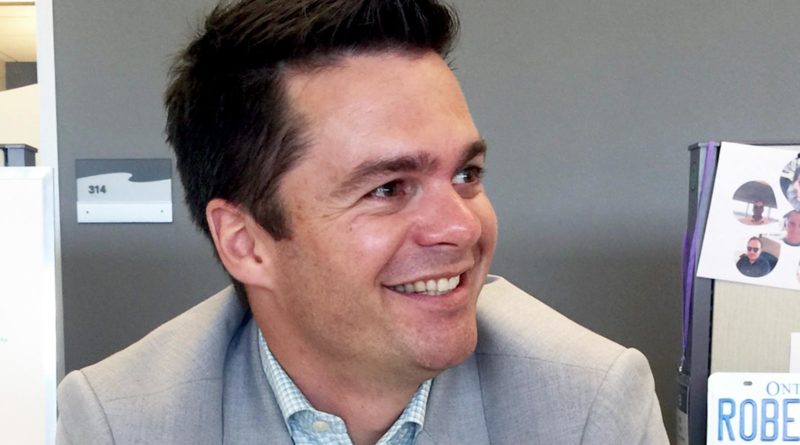Rob Evans – Backpacker College
Here are three facts about Rob Evans.
He loves business. He loves travel. And he failed his calculus class in second-year university.
Without that credit, he lost his spot in Laurier’s business program and had to enrol in a major he didn’t love. So he did something different.
“I sold my car, paid off my credit cards, bought a round-trip ticket to Australia and I went traveling,” he says.
With a credit limit of just $500, he had to work during the trip. Through his campus, he found a service that helped him set up a working holiday visa and a bank account.
He started in Coogee Beach – a suburb of Sydney – and continued on through Fiji, China, Hong Kong, and Malaysia before returning to Kitchener-Waterloo a year later.
But when he told his friends back home about his travels, he noticed something about their reactions.
“They were like, ‘that’s amazing! I wish I could do that!’” he says. “When I asked them, ‘Why don’t you go? What’s stopping you?’ essentially there were two common things.” Fear and cost.
Rob’s own experiences had been so incredible, eye-opening, and inspiring, he didn’t want others to miss out on their own journey. So he started research for Backpacker College, a service that connects backpackers with low-cost accommodation – think beds in college and university residences, low-cost boutique hotels, quality hostels, and other affordable options – along with fun things to do once they get there.
The idea didn’t come to fruition right away, though. He first went back to finish his degree in political science, and spent found work with other software and tech businesses. (His history includes a stint with a calculus software company, ironically enough.)
During that time, he continued collecting and researching business ideas – 40 of them, to be exact. Backpacker College was one file among many, tucked away in banker’s boxes.
It was during a move when the files resurfaced. “It became a point of sadness when I first saw it,” he says. “Oh my gosh, look at how many ideas I’ve had. My first instinct was that I had failed because I didn’t turn them into a success.”
But when he started combing through the files, his attitude changed. “Some of the ideas were not great, or they failed for different reasons: not the right time, or the right partnership, or sufficient capitalization,” he says.
“Of all the ideas, there were a handful of truly great ones in there. The one that stood out the best, the most compelling by far, was Backpacker College.”
It may not have worked eight years ago when Rob first began meeting with prospective partners, but smartphones have changed and trends today support the concept even more. No longer were backpackers booking trips through phone directories or travel agents exclusively.
“The backpacker of today is very different. Almost every backpacker that I know has a smartphone. They travel independently or in small groups, are different ages, students, working professionals, families, even retirees. To make things easier, the access to technology and ubiquitous communication at your fingertips is a game-changer.”
He addressed the barrier of affordability by looking at non-traditional accommodations that could offer similar prices to a hostel. “At least $30 a bunk bed – how can we get close to that price point?” he asked. “I was thinking college residences.”
Some are shared rooms with private or semi-private bathrooms. But locations also usually come equipped with single private rooms, or suites, and nice-to-haves like air conditioning, wifi, shared kitchens, common and social space, and parking.
These locations also address the issue of safety, he says. “There’s usually a front desk staff on hand. There’s actually several more doors and locks between the outside and your bedroom.”
Non-residence accommodations, like boutique hotels, are hand-picked to make the list, he adds, so backpackers don’t need to limit themselves to college and university towns or travelling only in the summer.
He also added a third benefit: finding things to do, like a concierge service. “To be able to take that knowledge and easily share experiences with budget travelers who might want to come to your town, who might want to come here on Wednesday for a live music night at Maxwell’s Music House for example, that will easily be done using our app.”
As for why he does it? Travel like this can change lives in a really positive way, he says. There are parts of his trip to Australia that impacted him so profoundly that he still looks back on them today and takes lessons from them.
The memories help Rob “refocus on what’s truly important in life, and certainly that type of perspective comes from being in places and having to rely on the kindness of strangers to navigate your way through a situation.”
That’s what he wants to share with others more than anything.
“Hopefully, if we do things well, people will be very grateful for having a platform that brings them the things they need to overcome their own fears or the cost challenges that can come with travel, and suddenly now it’s been made possible for them. Those are the things that I hope for.”
Plus, he’s setting an example for his eight-year-old son. “How can I possibly tell him that he should pursue his dreams if I don’t pursue my own?” he asks.
“If you know what you want to do and follow a straight path, that’s great. Do it. But if it takes you travelling to many countries, working for others, doing what you like and don’t like to truly know what you love doing… if you pursue it with 100% of your heart and your mind, and are okay asking for a little help along the way, you will succeed, too.”
Learn more at:
www.backpackercollege.com

